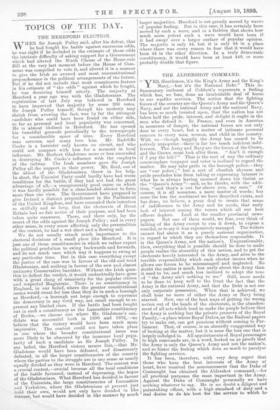TOPICS OF THE DAY.
•
THE HEREFORD ELECTION.
WHEN Sir Joseph Pulley said, after his defeat, that be bad fought his battle against enormous odds, he was right if he included in the estimate of those odds the intrinsic difficulty of asking support for a Government which had altered the Ninth Clause of the Home-rule Bill at the very last moment before the House of Com- mons was compelled to vote it, and altered it in a manner to give the Irish an avowed and most unconstitutional preponderance in the political arrangements of the future. But if he did not include that most conspicuous feature in his estimate of " the odds " against which he fought, he was deceiving himself utterly. The majority at Hereford a year ago was with the Gladstonians. The registration of last July was believed in Hereford to have improved that majority by some 200 votes. Sir Joseph Pulley himself, though his modesty may shrink from avowing the fact, was by far the strongest candidate who could have been found on either side, so far as personal and local popularity was concerned. He is almost idolised in Hereford. He has opened his beautiful grounds periodically to the townspeople for a, considerable space of time. Every Hereford man esteems, and many love him. Mr. Radcliffe Cooke is a barrister only known on circuit, and who could not compare with him for a moment in local influence. Mr. Herbert Gladstone more or less succeeded in destroying Mr. Cooke's influence with the etnployds of the railway. The Irish members gave Sir Joseph Pulley all the support in their power. Mr. Reid, one of the ablest of the Gladstonians, threw in his help. In short, the Unionist Party could hardly have had worse conditions for the battle, if they had not had the great advantage of all,—a conspicuously good cause on which it was hardly possible for a clear-headed elector to form more than one view. The Government have proposed to give Ireland a distinct preponderance in the Parliament of the United Kingdom, and have concealed their intention so skilfully and so long, that the electorate of Great Britain bad no fair notice of their purpose, and had been taken quite unawares. There, and there only, lay the secret of the odds against Sir Joseph Pulley ; and in every other sense, in every sense affecting only the personalities of the contest, he had a wet sheet and a flowing sail.
We do not usually attach much importance to the electoral decisions of a small place like Hereford. It is just one of those constituencies in which we rather expect the political pendulum to swing backwards and forwards, and do not much care which way it happens to swing at any particular time. But in this case everything except the justice of the case was in favour of the old and tried Gladstonian, and nothing in favour of the new and almost unknown Conservative barrister. Without the Irish ques- tion to deflect the verdict, it would undoubtedly have gone with a great clang of unanimity for the popular citizen and respected Magistrate. There is no constituency in England, in our belief, where the greater constitutional issues would count for less than they do in such a borough as Hereford,—a borough not large enough to represent the democracy in any vivid way, not small enough to re- present any limited class. If the battle had been fought out in such a constituency as the Lancashire constituency of Eccles,—we choose one where Mr. Gladstone's can- didate was successful both in 1890 and 1892,—we believe that the victory would have been much more impressive. The contest could not have taken place in one where the broader constitutional issue was more likely to be obscured by the immense local popu- larity of such a candidate as Sir Joseph Pulley. In our belief, the Hereford victory means this,—that Mr. Gladstone would have been defeated, and disastrously defeated, in all the larger constituencies of the country where the parties to the struggle are in any sense as nearly equally divided as they were in Hereford. The contest was a crucial contest,—crucial because all the local conditions of the battle favoured, instead of depressing, the hopes of the Gladstonians. What Hereford has decided in favour of the Unionists, the large constituencies of Lancashire and Yorkshire, where the Gladstonians at present just hold their own, would not only have decided in like manner, but would have decided in like manner by much larger majorities. Hereford is not greatly moved by waves• of popular feeling. But in this case, it has certainly been moved by such a wave, and in a fashion that shows how much more potent such a wave would have been if it bad swept over a larger surface of popular opinion.. The majority is only 44, but it is only 44 in a place where there was every reason to fear that it would have been 44 in the other direction. In a truly democratic constituency, it would have been at least 440, or more probably double that figure.


































 Previous page
Previous page